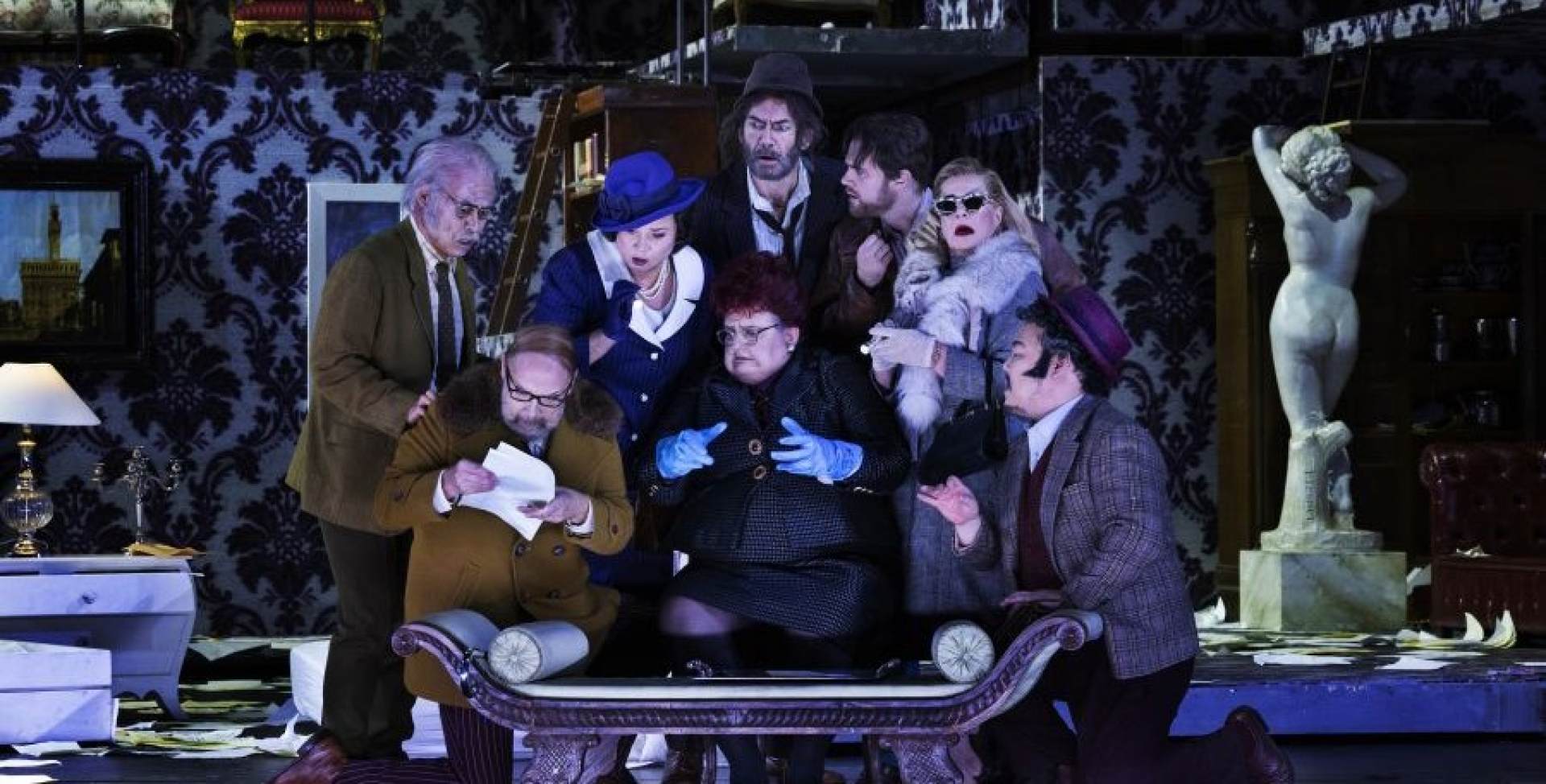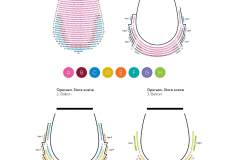Il Trittico
Mo | Tu | We | Th | Fr | Sa | Su |
Experience three magnificent Puccini operas in one evening in an award-winning staging.
Il trittico is performed in Italian with Danish and English supertitles.
Recommended for ages 12 and up.
Expected duration: 3 hours and 15 minutes incl. 1 interval
Why choose when you can have drama, tragedy and comedy all in one evening? Enjoy Puccini's operatic trilogy in Damiano Michieletto's critically acclaimed and Reumert award-winning production.
Il trittico consists of three one-act operas. The first, Il tabarro, is a tense drama of jealousy involving the love affair between Giorgetta and the dockworker Luigi, which leads to tragic consequences when her husband uncovers the deceit.
The drama continues in Suor Angelica, the story of a young nun who receives devastating news about the illegitimate child she was forced to relinquish.
The mood lightens with the final piece, Gianni Schicchi, a humorous comedy about greedy heirs attempting to trick their way into an inheritance, only to be outwitted by the cunning Gianni Schicchi.
The narratives that unfold on stage reveal the secret worlds of the three operas. Lies and deceit, sin and guilt, violence and death emanate from these Pandora's boxes, until they finally close again with the entire loot from Gianni Schicchi's deceit.
Newly appointed French principal conductor Marie Jacquot leads the Royal Danish Orchestra in performing the revival of Puccini's Il trittico at the Opera House. A host of Royal Danish Opera soloists will perform alongside international stars Ariunbaatar Ganbaatar, Misha Kiria and Adriana González.
Synopsis
IL TABARRO
Another workday has ended by the banks of the Seine where Michele, a barge-owner, lives with his young wife and his three stevedores Talpa, Tinca, and Luigi. Giorgetta serves her husband’s employees drinks, indulges in a few dances with them, and converses confidentially with the men and Talpa’s wife, La Frugola.
Giorgetta is particularly intimate with Luigi. She and the young stevedore are in love and they are having a secret affair. As the lovers are left alone, Luigi laments that he cannot stand to share Giorgetta with Michele for much longer, and Giorgetta assures him that she returns his affections. They plan to meet secretly on the deck later that evening.
Luigi departs, and Michele appears, seeking out Giorgetta. He is aware of his wife’s cooled affections, and tries in vain to learn what is wrong, and to win her back. He reminds Giorgetta of happier times, of their darling little son, who died some time ago, and of the way Michele used to enfold the three of them in his cloak on cold nights to keep them warm. Distraught at the thought of her son, Giorgetta leaves, lamenting that her feelings for Michele are no longer the same.
Alone, Michele contemplates the flowing Seine and overhears the declarations of love of a young couple promenading nearby. While Michele wonders if Giorgetta may have taken one of the stevedores as her lover, Luigi appears ready for his rendezvous with Giorgetta. Michele immediately understands the situation. He violently forces a confession out of the young man before killing him and wrapping his body in his cloak.
Giorgetta now emerges from the cabin. She regrets having hurt Michele, begs him to forgive her cold treatment of him and asks him to enfold her once more in his cloak. Michele’s cloak is now unfolded to reveal to a horrified Giorgetta her dead lover.
SUOR ANGELICA
While undertaking their chores in a remote, isolated convent, the sisters discuss their life at the convent, their sorrows, their secret dreams and aspirations. Only one of them, sister Angelica, claims to have no earthly desires. For seven years Angelica has lived in the convent, apparently satisfied with and resigned to her life as a nun, and her knowledge of curative herbs is of great help during times of illness or injury within the convent walls. Everyone knows, however, that Angelica is only feigning serenity and that she does cherish one fervent wish: To receive news from her noble family, from whom she has not heard since she took her solemn vows.
Her secret wish is granted as Angelica’s aunt, a princess, suddenly announces her arrival at the convent. The princess has been the legal guardian of Angelica and her younger sister since the death of their parents, and she delivers to Angelica the news that her sister is getting married. She asks Angelica to sign a document that will grant Angelica’s share of their parents’ inheritance to the younger sister. She goes on to reproach Angelica for the indiscretion that caused her family to send her to the convent: Seven years earlier, Angelica gave birth to an illegitimate son. Angelica confesses that she has never stopped longing for her child, whom she was only allowed to see once, and she asks her if the princess has any news of the little boy. The princess tells her that the boy died two years earlier of a fever. Upon hearing this, Angelica is grief-stricken and collapses in tears.
The princess departs, and Angelica mourns her son who died without the affections and care of his mother. She resolves to take her own life so that she may at least be united with her son in death. Shortly before dying she remembers that suicide is a mortal sin and begs the holy virgin for forgiveness and salvation. In her moment of death, it seems to her that she sees her son coming towards her.
GIANNI SCHICCHI
Wealthy Buoso Donati has died, and his relatives gather around his deathbed, eager to learn how he has willed his fortune. Rinuccio Donati, related to Buoso by way of his aunt, manages to uncover the will. Before handing over the will to his aunt, however, Rinuccio makes her give her word that he, if left wealthy by Buoso’s will, may marry his beloved Lauretta, daughter of Gianni Schicchi, a lowly newcomer to the city. The aunt agrees, and Rinuccio quickly sends for Lauretta and her father. As the Donati family reads the will, they are devastated to find that Buoso has bequeathed all his money to a monastery.
Gianni Schicchi and Lauretta arrive. Schicchi is ridiculed by the elder Donatis, but Rinuccio begs Schicchi, famous for his cleverness, to stay and help the Donati family in their distress. Schicchi is offended by the family’s snobbishness and is persuaded into helping only by Lauretta’s passionate statement that she will kill herself if she does not get to marry Rinuccio.
Gianni Schicchi invents a scheme: After making sure that no one outside the family knows about Buoso’s death, he decides to impersonate Buoso, in order to change the will. He reminds the Donatis that such a fraud, if discovered, is severely punished by the city laws, thus swearing the family to silence. A notary is summoned, and Gianni Schicchi begins to dictate a new will, disguised in bed as an ailing Buoso.
Buoso’s fortune is now evenly split by Schicchi among the family members, only a small amount is willed to the monastery – and Buoso’s villa, mule, and mill are all left to his “dear, devoted friend Gianni Schicchi”. As the notary has left, the elder Donati relatives all turn on Gianni Schicchi, furious at his betrayal. Gianni Schicchi responds by throwing them all out of “his” house. Rinuccio and Lauretta rejoice: Both of them wealthy they may now get married.
Program and cast
Conductor: Marie Jacquot / Dominik Beikirch
Director: Damiano Michieletto
Restoration Director: Marcin Lakomicki
Set Design: Paolo Fantin
Costume Design: Carla Teti
Light Design: Alessandro Carletti
Libretti: Giuseppe Adami (Kappen), Giovacchino Forzano
(Søster Angelica), Giovacchino Forzano (Gianni Schicchi)
Cast - Subject to change
Conductor: Marie Jacquot
Conductor: Dominik Beykirch
Michele: Ariun Ganbaatar
Luigi: Niels Jørgen Riis
Giorgetta, Nella: Sine Bundgaard
Tinca: Christian Damsgaard
Simone, Talpa: Kyungil Ko
Abbess, Ciesca, La Frugola: Hanne Fischer
A woman in love, Lauretta, Sister Genevieve: Louise McClelland Jacobsen
A man in love, Rinuccio: Jacob Skov Andersen
A man in love, Rinuccio: Gert Henning-Jensen
Sister Angelica: Adriana González
The Princess, Zita: Johanne Bock
Gianni Schicchi: Misha Kiria
The supervising sister: Cecilia Lund Tomter
The novice's teacher: Matilde Wallevik
Gherardo: Michael Kristensen
Betto di Signa: Steffen Bruun
Marco: Dong Huy Kim
A street singer: Lars Bo Ravnbak
Sister Osmina/Novice: Line Juul Andersen
Sister Dolcina/First lay sister: Marlene Metzger
Second lay sister: Hanna Leonora Hollesen
First begging sister: Taya Lukashova
Second begging sister: Åsne Sandegren
Spinelloccio: James Berry
Ser Amantio di Nicolao: Simon Schelling
Guccio: Rasmus Ruge
Pinellino: Lasse Christian Bach
Gherardino: Elliot Damm-Thorn
Gherardino: Thomas Creutz
The Copenhagen Opera House
The house is administered by the Royal Danish Theatre and is one of the best-equipped in the world. It has a main stage with five other stages directly connected, where large setups can be moved easily in and out. The theatre can seat between 1492 and 1703, depending on the size of the orchestra. The 1492 seats are all individually angled in order to provide the best experience.
The orchestra pit is one of the largest in any opera house, with room for 110 musicians; the structure provides excellent sound quality for the orchestra. If the pit is filled, some musicians are located just below the front of the stage, which has become controversial among some members of the orchestra (according to tour guides in 2005), because this increases the sound levels, beyond those acceptable in Denmark. However, the overhang is very slight and the authorities have permitted this to happen.
During construction of the theatre, some acoustic tests were carried out with the fire curtain in place while technical work was carried out on stage, but great consideration was given to balance between pit and stage. If the orchestra is small or absent, the pit can be covered and additional seats can be added to the auditorium.
Opera House entrance
Just like the old Royal Danish Theatre in Copenhagen, The Queen has her own box on the left side of the auditorium, closest to the stage. The foyer has been designed for comfort, based on behavioural research on opera goers maximizing the wall area for standing against, while still providing views across the entire foyer and one of the best views on Copenhagen. Guided tours cover most of the building, including both the auditorium and backstage areas.

 EN
EN DE
DE IT
IT FR
FR ES
ES RU
RU JP
JP RO
RO
 Seating plan
Seating plan 
